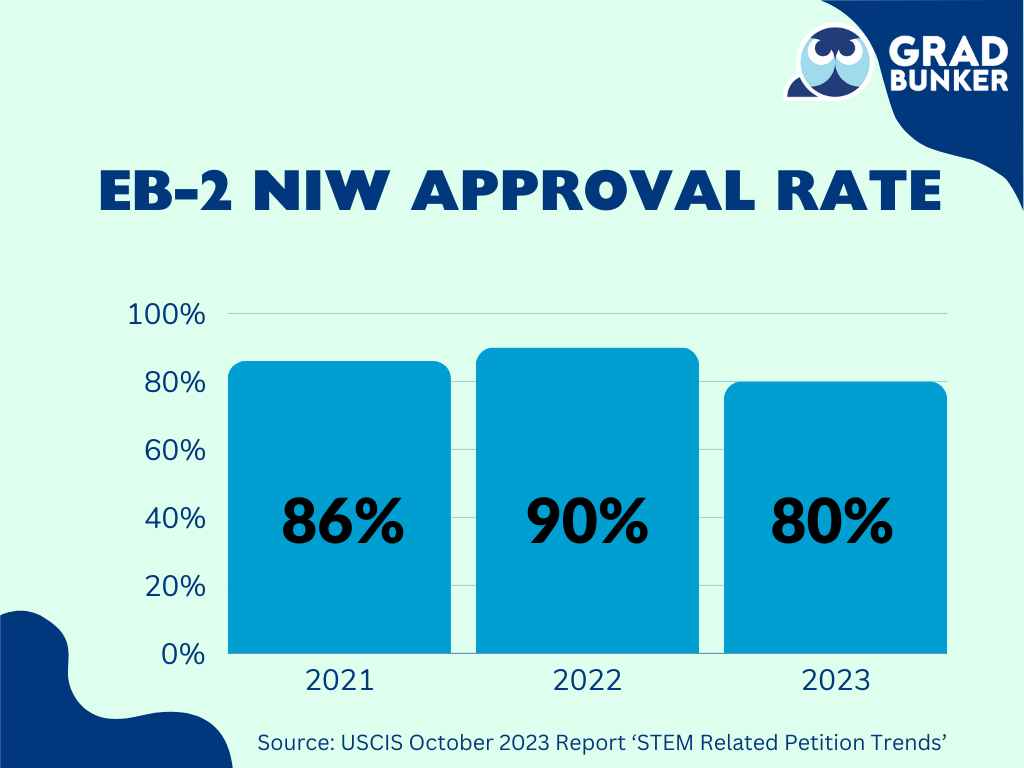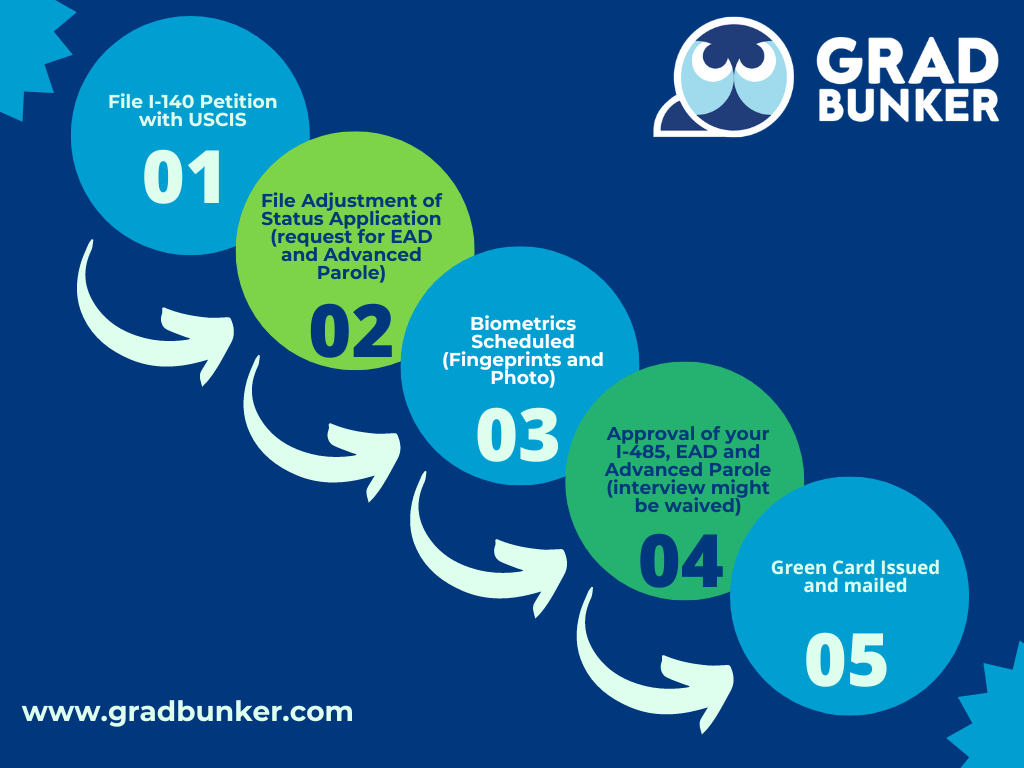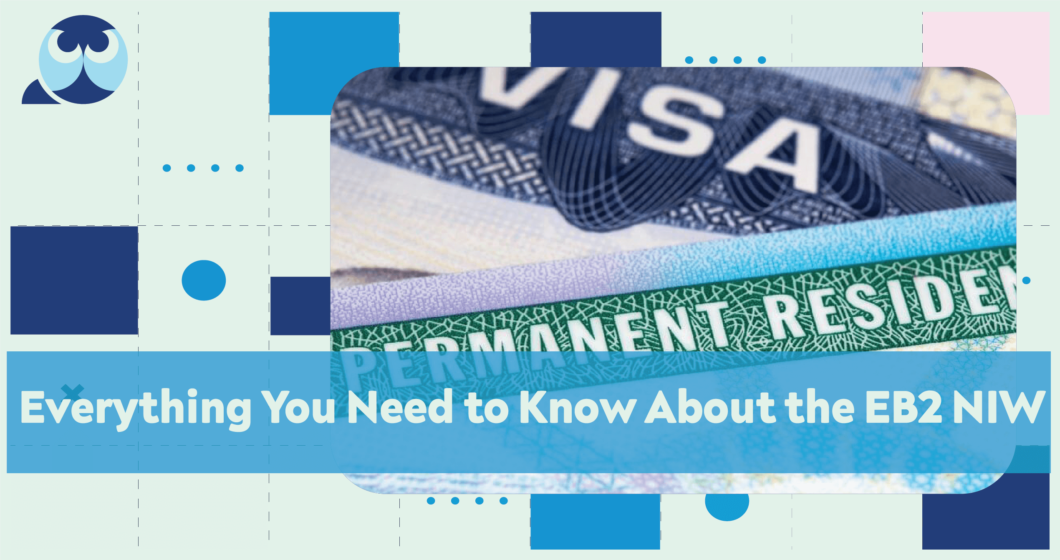The EB2 NIW is a unique immigration pathway that allows any qualified individuals across the globe to self-petition for a green card without needing a job offer or labor certification if they can demonstrate that their field and work benefits the United States on a national level. By bypassing the labor certification process, the EB2 NIW offers a streamlined path to permanent residency for qualified applicants and, thus, provides greater flexibility in pursuing the American Dream in the United States.
In this guide, we will delve into the specifics of the EB-2 NIW, providing you with a clear understanding of the eligibility requirements, the application process, and the benefits of this visa category. Whether you’re a researcher, entrepreneur, artist, or professional in another field, this guide will help you determine if the EB-2 NIW is the right option for you and how to navigate the self-petition process successfully.
The Dhanasar Three-Prong Test for EB2 NIW:
The National Interest Waiver (EB2 NIW) was first enacted by the U.S. Congress in 1990. However, for a very long period of time, the USCIS Administrative Appeals Office (AAO) used to evaluate all the applicants under the Matter of New York State Department of Transportation (NYSDOT, 1998) framework. Under the 1998 NYSDOT framework, an NIW petition had to pass the three-prong test as follows:
- Employment is of substantial intrinsic merit.
- Any proposed benefit must be national in scope; and
- National interest would be adversely affected if a labor certification were required for the foreign national.
The first two prongs were straightforward and easy to pass but the third prong was confusing and vague. Many USCIS immigration examiners adopted several vague and contradictory analytical approaches for the third prong test, creating inconsistencies in NIW adjudications, such as the petitioner being required “to submit; and the adjudicator being required to evaluate, evidence relevant to the very labor market test that waiver is intended to forego”.
Then, in 2016, the AAO dismantled the NYSDOT framework and introduced a much more lucid and precise framework for adjudicating NIW petitions. The new framework was based on Dhanasar immigration case decision and currently known as Matter of Dhanasar. Under the Dhanasar standards, an applicant must demonstrate the following three criteria:
- The foreign national’s proposed endeavor must have substantial merit and national importance.
- The foreign national is well-positioned to advance the proposed endeavor; and
- On balance, it would benefit the U.S. to waive the job offer and labor certification requirements of the EB2 category.
This new Dhanasar framework significantly impacted easing the adjudication process and thus opened the door of U.S. permanent residency to an expanded range of foreign nationals.
It should be noted that your proposed endeavor should substantially benefit the national interest of the United States. The merit of your proposed endeavor should benefit the United States in the following way:
- Improves the U.S. economy.
- Improves wages and working conditions of U.S. workers.
- Improves education and training programs for U.S. children and under-qualified workers.
- Improves health care.
- Provides more affordable housing for young and/or older, poorer U.S. residents.
- Improves the environment of the U.S. and makes more productive use of natural resources; or
- Has been requested from an interested U.S. government agency.
Am I Eligible for EB2 NIW:
The EB2 National Interest Waiver (NIW) is a unique provision available exclusively under the EB2 immigrant category. Essentially, the NIW entails additional requirements beyond those for EB2. Therefore, you must first qualify for the EB2 category to be eligible for a National Interest Waiver. There are two primary ways to qualify under the EB2 category: either as an advanced degree professional or as an individual of exceptional ability.

EB2 NIW – Advanced Degree Professional:
To qualify as an advanced degree professional, you must demonstrate the following:
(a) having any advanced degree beyond your bachelor’s degree, such as a master’s or Ph.D. You don’t need to earn that degree from the United States. Any US equivalent foreign degree is accepted.
Or
(b) If you do not have an advanced degree, then you can still qualify by demonstrating that you have the “equivalent” of an advanced degree with 5 years of progressive work experience in your field of expertise and your bachelor’s degree.
EB2 NIW – Exceptional Ability:
To qualify for EB2 based on exceptional ability, you must meet at least 3 of the following requirements:
- 10 years of full-time professional and progressive work experience in your field
- Degree in your field
- License to practice in your profession.
- Membership in professional associations
- Salary or other remuneration for services that demonstrate your exceptional ability.
- Recognition for your achievements and significant contributions to your industry or field by your peers, government entities, and professional or business organizations.
Benefits of EB2 NIW:
The prime benefit of the EB2 NIW is that you do not need a labor certification or job offer, which allows you to self-petition for this category. This eliminates the requirement to work directly with an employer for a certain period. As you do not need to obtain a labor certification, it also cuts down on processing times, as labor certification can take at least six months to process.
Other benefits pertain to permanent residency in the United States. Once you become a permanent resident, your hands are no longer shackled. You can lawfully do whatever you want. For example, if you are in school, you can take a break for any semester and do whatever you like. You no longer have to worry about losing a job like H1B visa holders; you can start any legal business and have the ultimate flexibility to pursue your American dream.
The EB2 NIW Petition Process:
Applying for the EB2 NIW involves several steps, each requiring careful preparation and attention to detail. Following is the step-by-step breakdown of the petition process.
Step 1 – Gather Supporting Documentation:
The first step is to collect all necessary documents to support your EB2 NIW petition. This includes:
Academic Credentials: Copies of your degrees, transcripts, and relevant certifications.
Evidence of Exceptional Ability: Documentation such as awards, memberships in professional associations, publications, and media coverage that demonstrate your exceptional ability.
Letter of Recommendations: Strong letters from experts in your field attesting to your qualifications and the national importance of your work.
Detailed Personal Statement: A comprehensive statement outlining your work, its national importance, and your plan for future activities.
Step 2 – File Form I-140 with USCIS:
The main form for the EB-2 NIW petition is Form I-140, Immigrant Petition for Alien Worker. You should complete the accurately and completely, as any errors can lead to delays or denials. Each I-140 form has an expiration date; make sure that you are submitting the latest form, or else your petition will be immediately denied.
Along with Form I-140, you must write a detailed cover letter explaining your case and eligibility for a national interest waiver. You must submit all the required documents and supporting documentation to strengthen your petition.
Step 3 – Adjustment of Status or Visa Processing:
USCIS will notify you once they approve your petition. USCIS follows a priority date based upon the petition filling date for further adjustment of your immigration status. If your priority date is current (see USCIS VISA bulletin page), then depending upon your location, you should either do an adjustment of status or undergo immigrant visa processing.
Adjustment of Status:
If you are lawfully present in the United States under a valid non-immigrant visa status, then you must go for adjustment of status. You should fill out Form I-485 with USCIS.
Immigrant VISA Processing:
If you are not lawfully present in the United States, then you need to apply for an immigrant visa at a consulate or embassy outside of the United States. You need to electronically file a DS-260 with the Department of State. As a part of the process of immigrant visa processing, you must attend a visa interview at a consulate or embassy.
Every year, USCIS issues a limited number of EB2 NIW VISAs. Therefore, depending on the availability of the visa number, you might have to wait for a while or even longer to get your approved immigrant visa.

Estimated Cost of EB2 NIW:
Getting a green card through EB2 NIW is a two step process. Upon approval of your Form I-140, you can apply for the adjustment of status or immigrant visa processing. The overall cost for the whole procedure is as follows:
Form I-140 Immigrant Petition for Alien Worker: USD 715. For premium processing you need to pay an extra amount of USD 2805.
Form I-485, Register for Permanent Resident: USD 1440. No premium processing option for Form I-485. Biometrics Exam Fee: USD 85
Medical Exam Fee (physician must be approved by USCIS): varies from 300 USD to higher.
DS-260 Form Fee: USD 325, plus an additional USD 120 is required to process the affidavit of support.
Estimated Processing Time:
The processing time for an EB-2 NIW (Employment-Based Second Preference National Interest Waiver) visa can vary depending on several factors, including the workload of the U.S. Citizenship and Immigration Services (USCIS) and the specific circumstances of each case. Generally, the process involves the following stages:
Filing of Form I-140:
Assuming that you already prepared your application package and are ready to submit your Form I-140. Depending upon which VISA center you sent your application, it takes 6 to 9 months to get approval for your Form I-140. However, if you go through the premium processing process of your I-140, USCIS will process your application within 15 – 45 calendar days. However, premium processing is suggested only when your priority date is current for adjustment of status.
Adjustment of Status or Immigrant Visa Processing with Current Priority Date:
If you are lawfully present in the United States, then you can go through the adjustment of status process. You need to submit the Form I-485 with some other additional forms and required documents. It should take around 6 to 9 months. However, if you are an applicant from outside the United States then you have to apply for the immigrant visa processing at near by consulate or US embassy. You also have to appear for the immigrant VISA interview. This might take 7 to 9 months.
Priority Date Not Current (VISA Backlog):
Countries like India and China have a very high demand for EB-2 category visas. This demand exceeds the number of available visas, resulting in visa retrogression (a visa backlog). Consequently, certain countries have a waiting list for obtaining an EB-2 visa. If you were born in a country with a visa backlog, once your I-140 petition is approved, you will need to wait for a visa number to become available (wait for your priority date to become current) before you can apply for your immigrant visa or adjustment of status. If this situation applies to you, the total time to obtain your green card can be many years.
Conclusion:
The EB-2 NIW offers a unique and valuable opportunity for individuals with advanced degrees or exceptional abilities to obtain permanent residency in the United States. By understanding the eligibility criteria, preparing a strong petition, and highlighting the national importance of your work, you can successfully navigate the self-petition process and contribute to the national interest.
We hope this guide has provided you with a comprehensive overview of the EB-2 NIW and the steps involved in self-petitioning. If you have any questions or would like to share your experiences, please leave a comment below. Your insights and inquiries can help others in their journey toward obtaining an EB-2 NIW.


Wonderful web site Lots of useful info here Im sending it to a few friends ans additionally sharing in delicious And obviously thanks to your effort